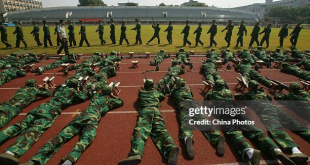By Staff writer

In recent decades, the bond between China and Africa has evolved beyond trade and infrastructure, with cultural exchange emerging as a vital component in fostering mutual understanding. As two of the world’s oldest civilizations, China and Africa share a rich tapestry of history, philosophy, and values. Through collaborative cultural initiatives, both regions are gaining deeper insights into each other’s societies, paving the way for stronger diplomatic and economic ties.
While formal diplomatic relations between China and African countries began in the mid-20th century, historical connections trace back centuries. Chinese maritime explorer Zheng He’s voyages to East Africa during the Ming Dynasty are a testament to early exchanges. Today, these ancient links are being revitalized through modern partnerships that emphasize cultural diplomacy alongside economic cooperation.
Language serves as a powerful tool for understanding and connection. Since 2004, China has established over 60 Confucius Institutes and 46 Confucius Classrooms across Africa, facilitating the teaching of Mandarin and Chinese culture. These centers have become hubs for cultural exchange, offering African students opportunities to learn the Chinese language and gain insights into Chinese traditions.
David Monyae, co-director of the Confucius Institute at the University of Johannesburg, South Africa, emphasizes the importance of cultural exchanges in strengthening China-Africa relations. “People-to-people exchanges should be a priority in China-Africa relations since the two sides need to better understand each other’s culture, history, and even law,” Monyaestates. He notes the growing interest among African youth to learn more about China, highlighting the significance of these cultural centers in fostering mutual understanding.
Art and storytelling offer profound insights into a civilization’s soul. Joint film productions, music collaborations, and art exhibitions between China and African nations have flourished in recent years. These creative endeavors provide platforms for both sides to share their narratives, fostering empathy and appreciation for each other’s cultures.
African musicians collaborating with Chinese artists exemplify the blending of traditional sounds with contemporary styles, creating unique cultural fusions. Similarly, Chinese audiences are gaining exposure to African films and literature, gaining a deeper understanding of Africa’s diverse cultures and histories.
Education plays a central role in cultural understanding. Thousands of African students receive Chinese government scholarships to study in China each year. These students engage not only in academic pursuits but also participate in cultural immersion activities that provide a window into Chinese society and values. Many return home as bridges between the two civilizations, often taking up roles in diplomacy, business, education, and civil society.
Conversely, Chinese scholars and students studying in Africa contribute to research in African history, languages, economics, and development. Academic conferences and partnerships between Chinese and African universities promote mutual learning and challenge traditional Western narratives about both regions.
Through sustained cultural engagement, China and Africa have come to recognize parallels in their civilizational trajectories. Both have rich and ancient cultures marked by deep philosophical traditions—Confucianism in China and Ubuntu in Africa—that emphasize community, harmony, and moral responsibility. Both have also experienced colonial exploitation and are now charting their own courses of development, often prioritizing sovereignty, stability, and modernization with local characteristics.
By exploring these commonalities, cultural exchange helps dismantle the sense of “otherness” and fosters a sense of solidarity rooted in shared historical experiences and aspirations for the future.
More grassroots-level collaboration, including youth exchanges, community partnerships, and independent artistic initiatives, can enhance authenticity and sustainability. Involving civil society, non-governmental organizations, and local artists will also broaden the impact and deepen cultural literacy on both sides.
Cultural exchange between China and Africa is more than soft diplomacy—it is a journey toward deeper understanding and mutual respect. As Chinese and African people continue to interact, study, create, and celebrate together, they are weaving a new tapestry of global cooperation. This partnership is not only redefining geopolitical alignments but is also enriching the human experience by revealing the beauty, complexity, and resilience of two of the world’s most storied civilizations.
By learning from each other, China and Africa are not just building a future of shared development—they are also cultivating a deeper, more human connection that transcends borders.
 Africa -China Review Africa -China Cooperation and Transformation
Africa -China Review Africa -China Cooperation and Transformation
